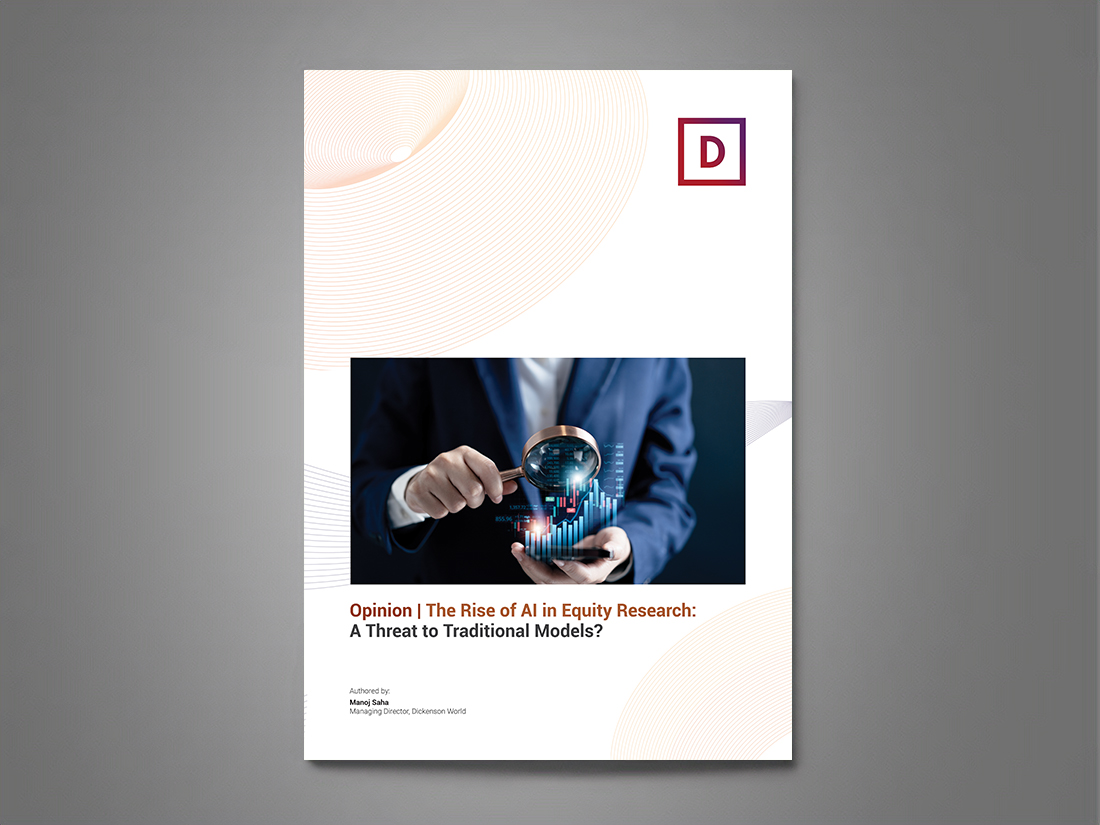Opinion | The Rise of AI in Equity Research:
A Threat to Traditional Models?
The investment research industry, long dominated by brokerage houses and research firms, stands on the brink of disruption with the advent of AI-driven tools like Seeking Alpha’s Virtual Analyst Reports. These reports, integrating proprietary quantitative models and crowdsourced insights, promise to reshape how equity investors approach stock analysis. But does this innovation pose an existential threat to traditional Initial Coverage Reports (ICRs) produced by brokerage firms? To answer this, we must dissect the implications of such AI-powered offerings on the landscape of capital markets.
The Traditional Model of Equity Research
Equity research, particularly ICRs, has historically served as a cornerstone of the capital markets ecosystem. ICRs provide in-depth analyses of a company’s business model, financial health, competitive landscape, and future prospects. These reports not only inform investors but also play a critical role in capital raising, helping issuers attract attention from institutional and retail investors alike. Moreover, the credibility of these reports is underpinned by their authors—seasoned analysts with sectoral expertise and a rigorous methodological approach.
However, the traditional model is far from perfect. Conflicts of interest between research departments and investment banking arms, high costs of production, and limited scalability have made these reports increasingly vulnerable. As investors demand more accessible, data-driven insights, AI-powered tools like Virtual Analyst Reports seem poised to fill the gap.
What Makes Virtual Analyst Reports Different?
Virtual Analyst Reports leverage generative AI to synthesize insights from trusted sources, including its Quant ratings and analysts’ articles. Unlike traditional equity research, these reports are:
-
Scalable: Covering every U.S.-traded stock with analyst earnings estimates, they eliminate the resource constraints of human analysts.
-
Dynamic: Automatically updated as new data and analysis become available, they ensure relevance and timeliness.
-
Cost-Effective: Available to Premium and PRO subscribers at a fraction of the cost of accessing institutional research
The integration of AI allows these reports to address two fundamental investor questions: “What should I know about this stock?” and “Should I own it?” By relying on data with proven performance track records, these reports aim to avoid the pitfalls of generic AI tools, which often lack domain-specific reliability.
The Disruption at Hand
The rise of AI-powered research challenges the monopoly of traditional brokerage firms in multiple ways:
-
Democratization of Insights: Virtual Analyst Reports make high-quality stock analysis accessible to retail investors who lack the resources to access institutional reports.
-
Speed vs. Depth: While traditional ICRs offer unparalleled depth, their production timelines cannot match the near-instantaneous updates of AI-driven reports.
-
Investor Preferences: As the market gravitates towards cost-efficiency and actionable insights over exhaustive detail, AI solutions align well with shifting demands.
“The future will belong to those who synthesize the intuitive judgment of human expertise with the relentless precision of machine intelligence.”
Will Brokerage Research Become Obsolete?
The short answer is “no, but with caveats.” Traditional equity research’s depth, human judgment, and nuanced understanding of complex markets remain irreplaceable—at least for now. Institutional investors, who rely on bespoke analysis and sector expertise, are unlikely to abandon traditional reports entirely.
However, the threat to research coverage of small- and mid-cap stocks is real. These segments, often underserved by traditional brokerage firms due to cost constraints, could see their research ecosystem increasingly dominated by AI-powered tools. Furthermore, the role of traditional analysts may evolve into curating and validating AI-driven insights rather than producing original reports.
A Bold Prediction
By 2030, I believe that the majority of retail investors will rely primarily on AI-powered tools for stock analysis, reducing the demand for traditional equity research among this segment. Brokerage firms will be forced to pivot—either by integrating AI into their workflows or by focusing exclusively on high-value, bespoke research for institutional clients. Meanwhile, issuers may begin leveraging AI-generated reports for investor outreach, bypassing traditional channels altogether.
“By 2030, I believe that the majority of retail investors will rely primarily on AI-powered tools for stock analysis, reducing the demand for traditional equity research among this segment.”
This shift could have profound implications for the capital markets. Reduced reliance on traditional research may undermine the pricing power of brokerage firms, potentially eroding their revenues. Conversely, it could democratize access to market intelligence, leveling the playing field for retail investors.
The Future of Equity Research
As the contours of equity research are redrawn by AI innovations, the industry is at a crossroad. The survival of traditional models hinges not on resisting these advances but on embracing their transformative potential. The future will belong to those who synthesize the intuitive judgment of human expertise with the relentless precision of machine intelligence. For investors, the promise of accessible, reliable, and dynamic insights marks the beginning of a new paradigm—one where the tools of tomorrow elevate, rather than erase, the foundational principles of thoughtful and strategic analysis.
Contact Us: To learn more or schedule a consultation, please reach out to us at www.dickensonworld.com
Email:enquiry@dickensonworld.com.
About the Author
With over 25 years of experience in corporate finance and a deep-rooted understanding of ESG imperatives, Manoj Saha brings a wealth of knowledge to the discourse on corporate governance. Educated in the UK in Accountancy & Finance, he has dedicated his career to guiding organizations through the intricacies of financial management and stakeholder engagement across global markets, including India, the USA, the UK, and the Middle East and North Africa (MENA) region.

Opinion | The Rise of AI in Equity Research
To download and save this article.
Authored by:
Manoj Saha
Managing Director, Dickenson World
Visit www.dickensonworld.com to learn more about our services and how we can help streamline your corporate reporting process.


Leave A Comment